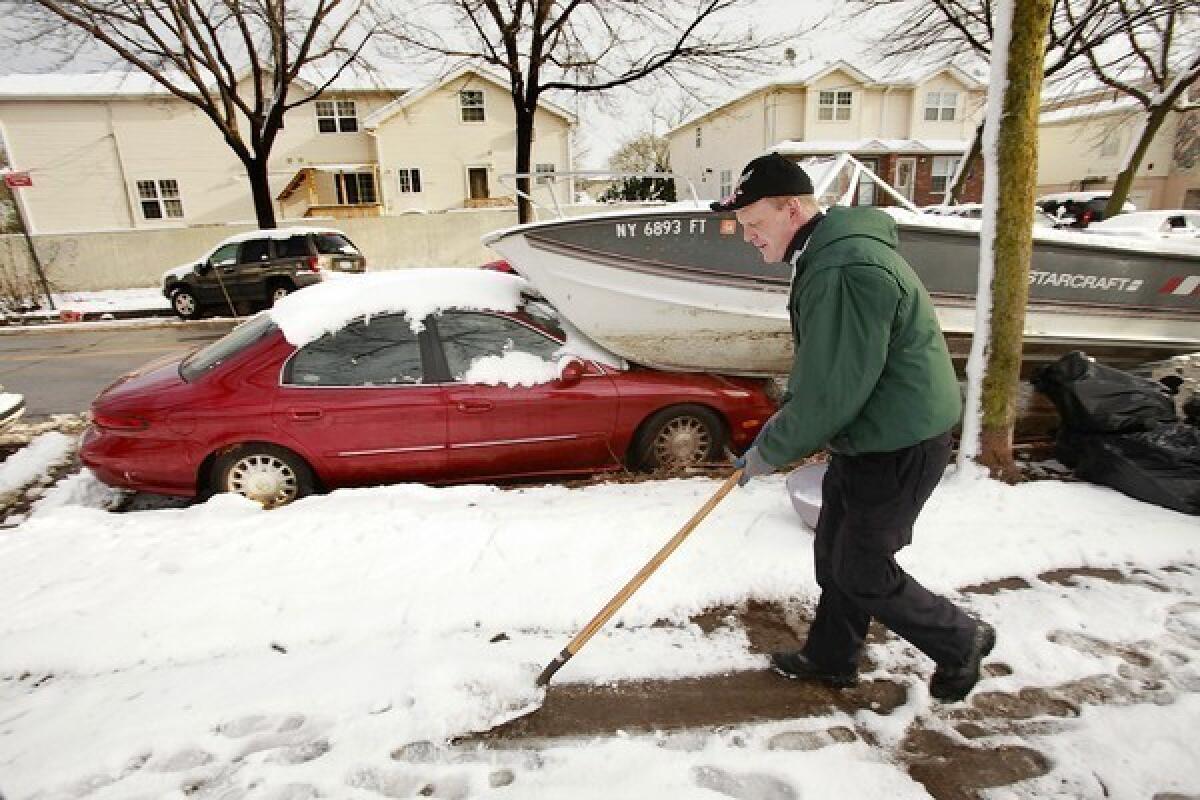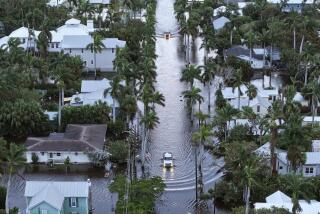A cold slap to Superstorm Sandy’s victims

Los Angeles Times
NEW YORK — They stood like refugees, clutching jerrycans in an icy wind and waiting behind a gas truck to fill their 5-gallon containers. Across the street, others lined up to ask for help, with wish lists reflecting the extent of their needs: a car to replace one washed away; money for a family of five in a hotel; advice on rebuilding a business.
Any sense that New York City was returning to normal 11 days after Superstorm Sandy was swept away Thursday after a nor’easter made a terrible situation nearly unbearable in areas still struggling to recover from Sandy. The new storm cut power to about 100,000 people and was blamed for the death of a man in Burlington, N.J. The freezing rain, sleet and snow — 9 to 12 inches fell in some areas — fell on those who are running out of patience.
“I’m fed up. I’m fed up,” Wale Kiladejo said as he waited with his wife, Eunice, to speak to someone at one of the mobile centers set up by the Federal Emergency Management Agency on the devastated Rockaway Peninsula in the New York borough of Queens. “Around this area, nothing is back to normal. But you go to Manhattan where all the rich people live — they have power.”
Could it get any worse?
“No. Seriously, no,” said Joan Fitzgerald. “It’s just a nightmare.”
Residents — many of them members of her extended family — trudged along an avenue lined with wood-frame homes whose porches once overlooked an idyllic scene: a sandy beach on Jamaica Bay, the skyline of Manhattan visible in the distance. Today, the view is of discarded household items, including washing machines and sofas. The houses were nearly all flooded, and the porches and yards that once housed surfboards, barbecues and bicycles were heaped with sandbags, mud and generators.
“We have nothing. We have no gas. We have no electricity,” said Adam Bishop, a Brooklyn firefighter who worried it might be spring before all the homes had power again.
Residents weren’t alone in losing their tempers. New York Gov. Andrew Cuomo delivered a blistering attack on his state’s utility companies, in particular the Long Island Power Authority and National Grid on Long Island. The back-to-back storms exposed the vulnerabilities of the state’s power companies and fuel delivery services, he said. “I believe they were unprepared; I believe the system is archaic.”
About 188,000 Long Islanders remained without power Thursday morning.
New York Mayor Michael R. Bloomberg, following the lead of New Jersey Gov. Chris Christie, ordered gas rationing. Vehicles with license plates ending in even numbers or zero would be allowed to buy gas on even-numbered days, such as Nov. 10, while drivers with plates ending in an odd number or a letter could buy fuel on odd days.
“Frustrations are only growing. And it now appears that there will be shortages for possibly another couple weeks,” Bloomberg said as long lines of cars choked traffic near the few open stations, and as police stood guard to prevent clashes at the pumps.
The federal coordination officer for FEMA, Michael Byrne, said the agency was doing the best it could under circumstances that tested even those in the business of dealing with disasters. So fierce was the wind from the nor’easter that one of the giant white tents sent up to house a mobile FEMA center in a parking lot in Queens had blown down.
The center, and other mobile units, were running again Thursday afternoon, handing out blankets, meals, water, and advice to the desperate crowds that gathered through the day. City buses sat in the parking lot, offering “warming centers” for those who needed a break from the cold.
“We’re here. We’ve established a presence to make them realize they’re not alone,” said Byrne, who admitted that dealing with Sandy and now the snow and cold had turned his days into a blur. “I’ve got to tell you, this one humbled me,” the former New York City firefighter said.
In addition to having more than 2 million liters of water and 1.5 million meals available, Byrne said FEMA was helping local governments by covering their costs for garbage pickup for the next 30 days. But he warned that full recovery “is going to take a long, long time.”
How long he couldn’t say, but it clearly was not going to be soon enough for many.
“We’re fine, if Mother Nature leaves us alone,” said Clete Strayer, manager of the agency’s disaster recovery center on Staten Island in the beachside community of New Dorp. FEMA staff who were forced to shut relief operations during the nor’easter reopened next to a snow-crusted field Thursday, setting up tables and heating units.
Hundreds of storm victims took shelter in large heated tents erected in parking lots outside Monmouth Park racetrack in Oceanport, N.J., about 50 miles south of New York City.
John Polacek, a retired postal worker from Seaside Park, said he was taken to a tent Wednesday night from a community center in Toms River, where he had been staying since Sandy devastated his town.
“It’s definitely not as good as where we were,” Polacek said.
In Middletown, Nilsa Colon and her husband piled clothing and food into a van at Middletown Assemblies of God Church and drove to nearby Keansburg, a waterfront town hit hard by Sandy. Debris was piled high near homes and the waterfront amusement park. Storm-damaged roller coasters, bumper cars and other rides sat abandoned.
Some church members lost everything, she said. The nearest FEMA assistance center was five miles away, and many storm victims lost their cars to flooding. Some had been offered housing by FEMA, but miles away from their neighborhoods, making it impossible for them to get to work or get their children to school.
“They lost their house already; now they’re going to lose everything else,” she said.
molly.hennessy-fiske@latimes.com
Shashank Bengali contributed to this report from Staten Island, N.Y.
More to Read
Sign up for Essential California
The most important California stories and recommendations in your inbox every morning.
You may occasionally receive promotional content from the Los Angeles Times.












